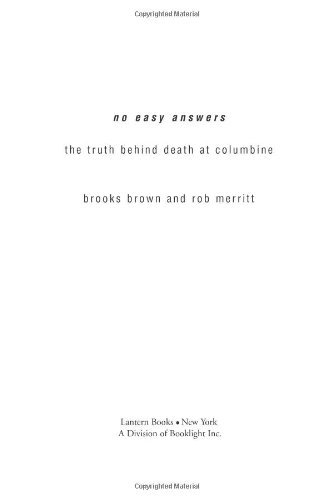What do you think?
Rate this book


Few people knew Dylan Klebold or Eric Harris better than Brooks Brown. Brown and Klebold were best friends in grade school, and years later, at Columbine, Brown was privy to some of Harris and Klebold's darkest fantasies and most troubling revelations After the shootings, Brown was even accused by the police of having been in on the massacre--simply because he had been friends with the killers.
Now, for the first time, Brown, with journalist Rob Merritt, gets to tell his full version of the story. He describes the warning signs that were missed or ignored, and the evidence that was kept hidden from the public after the murders. He takes on those who say that rock music or video games caused Klebold and Harris to kill their classmates and explores what it might have been that pushed these two young men, from supposedly stable families, to harbor such violent and apocalyptic dreams.
Shocking as well as inspirational and insightful, No Easy Answers is an authentic wake-up call for all the psychologists, authorities, parents, and law enforcement personnel who have attempted to understand the murders at Columbine High School. As the title suggests, the book offers no easy answers, but instead presents the unvarnished facts about growing up as an alienated teenager in America today."If there is any solace to come out of a tragedy of the magnitude of the Columbine shooting, it is what lessons might be learned in its aftermath. With bravery, wit, and striking honesty, Brooks Brown and Rob Merritt allow us a glimpse into what led to that event, what happened afterward, and most importantly, why any community would be naive to think it might not happen to them, too. How thin is the line between a bully and a victim? Who is to blame, when a community is turned inside out? As No Easy Answers suggests, it may just be the community itself. And it offers up a question of that resonates after the last page is turned: What can you and I do to keep this from happening again? If you're a parent, read this with your child; if you're a teen, leave this on your parents' bedside table--and above all else, start the conversation too much of this world is unwilling to have." --Jodi Picoult, author of the New York Times #1 bestselling novel Nineteen Minutes
284 pages, Kindle Edition
First published September 30, 2002
“Truth is stranger than fiction, because fiction has to make sense.”
- Mark Twain